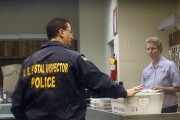
When I was a college freshman I did what many freshmen do and opened a bank account with the local bank on the first day. They had a little booth at the campus center during orientation, and with my account I got a checkbook and a debit card and I think a couple of pens, a stress ball and a key chain.
Thing is, my debit card didn't show up in the mail for months — I think they mailed it to my parents' house and it got thrown out accidentally, and then it took forever for the bank to issue a new one. As a result, I spent that whole first semester writing checks for everything — I distinctly remember writing a check for 75 cents for a couple packets of ramen noodles at the campus store. And because the bank charged me a dollar to look up my balance at the ATM, I kept track of my balance manually with my checkbook ledger — and did a pretty good job of it, too.
This way of participating in commerce was obsolete even at the time, and today almost nobody writes checks for everyday purchases. But when they do, they run an increasingly significant risk of having their checks intercepted by fraudsters, who
Industrywide estimates of the total national value of check fraud losses are difficult to pin down, but the estimates are alarming. The
That's kind of nuts, especially when one considers that
If only there were some way to allow businesses and consumers to make payments quickly and inexpensively that could replace the current use cases for checks. Oh wait, there is such a thing: The Federal Reserve's faster payments rail FedNow.
The rationale for creating a
It makes a lot less sense if the Fed — having taken the considerable time and expense to create FedNow — has no interest in making faster payments an everyday reality for ordinary consumers.
To be sure, there are problems with faster payments as well. The
Check fraud is a necessary evil only insofar as checks are necessary, and I am going to go out on a limb and say that the future of payments in the 21st century does not have to include paper checks. I suspect there's a reason why 80% of check fraud in the world happens in the Americas: because the country with the biggest economy is also one of the biggest laggards in adopting faster payments. Making that transition will take some thought and a careful weighing of carrots and sticks, but it needs to be a priority, and the failure to make it a priority is unwittingly enabling fraudsters.






